Death and Drugs at a Farmer John Pig Farm
Filth, antibiotic-resistant bacteria and cruelty found by investigators at a Hormel Foods-owned farm
 Farmer John's famous Dodger Dog. Photo from Wikipedia
Farmer John's famous Dodger Dog. Photo from Wikipedia
The Hormel Foods-owned Farmer John slaughterhouse and processing plant in Vernon, CA, just south of downtown L.A., is known for its colorful mural of happy pigs enjoying themselves on lush green fields under a bright blue sky. But the pigs inside the 900,000-square-foot facility are anything but happy; and the Hormel-owned farm in Kings County, CA, 180 miles northeast of LA, where 150,000 pigs spend their short six-month lives without ever setting foot outdoors, is nothing the company wants consumers to see.
A recent eight-month investigation from mid-2015 into early 2016 conducted by the international animal rights network Direct Action Everywhere (DxE) found and documented filthy, inhumane overcrowding at the pig farm, just outside Corcoran, CA.
Investigators documented at least five different antibiotic drugs administered to the pigs through their water or food, despite warnings from the Food and Drug Administration (FDA), the United States Department of Agriculture (USDA), the World Health Organization (WHO) and the Centers for Disease Control and Prevention (CDC) that this practice has produced antibiotic-resistant bacteria, a serious hazard to human and animal health.
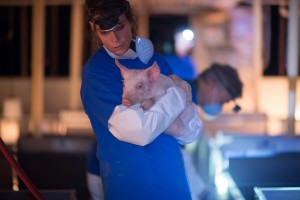
Former “Baywatch” star and longtime activist Alexandra Paul rescuing a pig at Farmer John farm. Photo by DxE.
DxE engages in “open rescue,” which was pioneered in Australia by the animal rights activist Patty Mark. During an open rescue, activists walk into a farm or slaughterhouse in the middle of the night, document the conditions using high-quality video and still cameras, and rescue one or more sick or injured animals to receive veterinary care. When the results of the investigation are released to the public, the activists publicly announce themselves, stepping forward to talk about what they saw.
“Open rescue differs from other forms of investigatory work in that we do not attempt to trick farmers into getting access to the farms,” said Wayne Hsiung, DxE co-founder and lead investigator. “We just walk right in. We don’t wear masks. And our central goal is not just to document but to rescue. We share the stories of the individuals we rescue because we know that stories — powerful, emotional narratives — can transform the world.”
Footage shot by DxE shows pigs crowded so tightly they can barely move. In some cases, piglets are seen eating other still living piglets. Many of the animals have tennis ball-sized abscesses, and documents found by DxE at the facility indicate that pigs there suffer twice the rate of infections allowed by Hormel’s own quality-control standards.
According to DxE’s investigative report, “Superbugs in America’s Pig Farms,” released in late June, “many pigs were covered with feces” and investigators witnessed “lame animals being trampled to death and piles of dead piglets.”
Hormel, one of the biggest pork suppliers in the nation, pioneered the use of antibiotic drugs beginning in 1950 to speed the growth of pigs, and they’ve been using massive amounts of antibiotics to fatten animals and keep them alive in unhealthy indoor environments ever since. Shortly after Hormel scientists discovered the growth promoting property of antibiotics, the rest of the pork industry began using them at their own farms.
According to the Food and Drug Administration (FDA), some 80 percent of all antibiotics in this country are used on animals raised for food. Typically, they are not administered to sick individuals but rather delivered to an entire facility to not only prevent disease in significantly unhealthy environments but to promote animal growth.
Despite being dosed with these drugs, many of Hormel’s Farmer John pork products are billed as “natural” (the company has an entire “California Natural” line). Stores that sell Farmer John brand meat include Wal-Mart, Target, Sam’s Club, Bel Air, Food Maxx, Vons, Ralphs, Lucky, Safeway and Costco. Farmer John also produces the LA Dodgers’ high-profile Dodger Dogs.
At Hormel’s 420-acre Farmer John farm outside Corcoran, DxE investigators discovered that pigs were being fed Pre-11 Pellet Mx whose active ingredient, Carbadox, has been found to be carcinogenic, even at trace levels (the FDA, in early April, began the process of banning it). In its report, DxE wrote that a United Nations/World Health Organization agency, the Codex Alimentarius Commission, has determined that there is no safe level of residues of carbadox or its metabolites in food that represents an acceptable risk to consumers.
In addition to carbodox, internal documents from the farm show that the pigs receive the antibiotics NeoMed 325 (Neomycin), GenGard (Gentamicin), Pennchlor 4 (tetracycline) and Penicillin G Potassium in their water.
In 2013, Robert S. Lawrence, an M.D. and the director of the Center for a Livable Future at the Johns Hopkins Bloomberg School of Public Health, told Consumer Reports, “When you give low-dose antibiotics for growth promotion or for prophylaxis of infection, you end up killing off the susceptible bacteria, whether they’re E. coli, Salmonella, Campylobacter, or other bacteria. And you continue to select for those bacteria that, through spontaneous mutations or transfer of genes from other resistant bacteria, allow them to be resistant to antibiotics.”
DxE cited a Consumer Reports 2013 investigation that found that 69% of the pork chops and ground pork sampled from farms including Hormel, Hormel Natural Choice and Farmer John tested positive for Yersinia enterocolitica, a bacterium that can cause fever, bloody diarrhea, abdominal pain and arthritis. Additionally, Salmonella, Staphylococcus aureus or Listeria monocytogenes were found in three to seven percent of the samples, and Enterococcus was found in 11 percent. Some of the bacteria were found to be resistant to multiple drugs or classes of drugs.
At the Farmer John farm, DxE investigators took multiple samples from open wounds on the pigs that tested positive for Campylobacter (a gastrointestinal infection that can be fatal for humans) and an antibiotic resistant form of Staphylococcus aureus (which kills about 11,000 people in the US each year, according to the CDC).
Not only can antibiotic-resistant bacteria be transmitted to humans via animal food products and produce that has been fertilized with manure, but the bacteria can also travel in the air.
The American Medical Association, the World Health Organizaiton, the CDC, the FDA, the American Public Health Association and the Pew Charitable Trust Foundation all oppose the use of sub-therapeutic antibiotics to farmed animals.
DxE investigators described a stench inside and outside the Farmer John barns that was more powerful than anything they’d ever encountered. “The smell was sickening, a combination of filth and rotten flesh,” Hsiung said. “The odor was so powerful that it stayed in our hair and on our equipment for days afterwards,” even after repeat washings.
The DxE report also notes that “the cries, screams and squeals of the animals were almost deafening.” More shocking “were the thousands and thousands of pigs packed shoulder to shoulder in hundreds of disgusting and filthy pens.”
DxE investigators “saw numerous dead bodies and pigs who were lame and/or languishing. A large number of the pigs were panting — an indication of difficulty breathing and acute distress. Some of the pigs were suffering from prolapse, a gruesome condition which is fatal if not treated where the uterus or intestines fall out of the pig’s body.”
A doctor of veterinary science, Sherstin Rosenberg, stated in the DxE report, “It is my professional opinion, based upon viewing the video file provided, that the animals at the facility are being subjected to systematic animal cruelty.”
Responding to the investigation, a Hormel spokesperson said in a statement, “A third-party auditor completed an on-site assessment within 24 hours of the [DxE] video’s release. The farm passed the audit and no animal welfare concerns were identified.”
***
DxE members found and rescued one piglet that was sick, and being eaten by other, much larger pigs, naming her Miley after the pop star and animal-rights advocate. “The investigators felt morally compelled to remove the piglet and rush her to receive veterinary care, where she was diagnosed with pneumonia and septic arthritis,” the report stated.
Miley, now healthy, lives with another rescued pig at an animal sanctuary which the DxE investigatory team visited in late February of 2016. The two pigs had the run of the place, where a number of dogs, as well as chickens and other rescued animals live. After munching on some broccoli in the sanctuary kitchen, Miley played with a treat dispenser toy, while the other rescued pig flopped on a dog bed for an afternoon snooze.
“I think she enjoys having the freedom to go where she wants,” said a sanctuary worker. “She goes on adventures in search of food and there’s a shady spot under the Cyprus trees where she likes to sleep.”
Miley ran out through an open doorway to a field where she began rooting in the dirt, an activity that was impossible at Farmer John.
“DxE is trying to bring liberation to life, to put liberation in action,” Hsiung said, watching her. “It nearly broke some of our team members to leave [tens of thousands of pigs] behind. We knew [going in] that we could only save a handful. But for the ones we could save, it meant everything.
“It may take a generation,” Hsiung continued, “but we expect to see a day where this sort of abuse is no longer allowed and every one of these animals can be saved.”
Michael Goldberg is a former Rolling Stone Senior Writer. He is an animal rights activist and a member of DxE. His first novel, True Love Scars, was published in 2014; his second, The Flowers Lied, was published in March 2016.
Leslie Goldberg, a former San Francisco Examiner reporter who was nominated for a Pulitzer, contributed to this story.

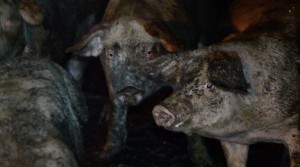
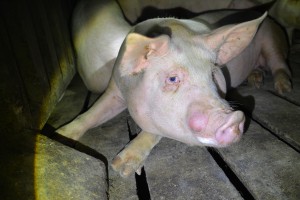
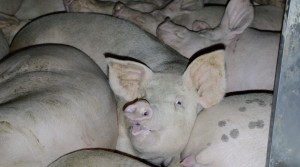
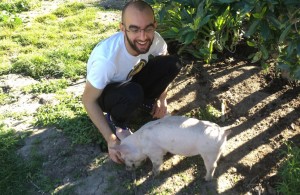
It is outrageous. The only way to stop it is to not eat animal products. I thank all the people putting themselves at risk by rescuing the few that they can. This is a form of torture.
While beyond horrific to read, as are all of these wretched inhumane accounts of gross cruelties to animals espec. farmed creatures, I deeply appreciate this account and am grateful to those persons who take it upon themselves to bring this knowledge to a wider audience/consumer. I will tell all who will listen! As a person who has long had a plant-based diet as a result of such -like accounts, it is VITAL that this info. is revealed. Thank you!
Thank you Elaine for helping spread the word about these atrocities.
Sickening and heartbreaking! I have been vegan for 10 years,vegetarian since’78. I am a vet tech and also pet sit. I pet sit across the street from where Mr.Hormel and his young vegan wife live. He owns 3-4 huge homes in a row on the Ft.Lauderdale intracoastal. One of the houses he uses as an office for all his employee’s. He is elderly and I think he is a son.
Thank you Michael for exposing the truth behind these factory farms – the damage they do to our health and to the lives of animals.